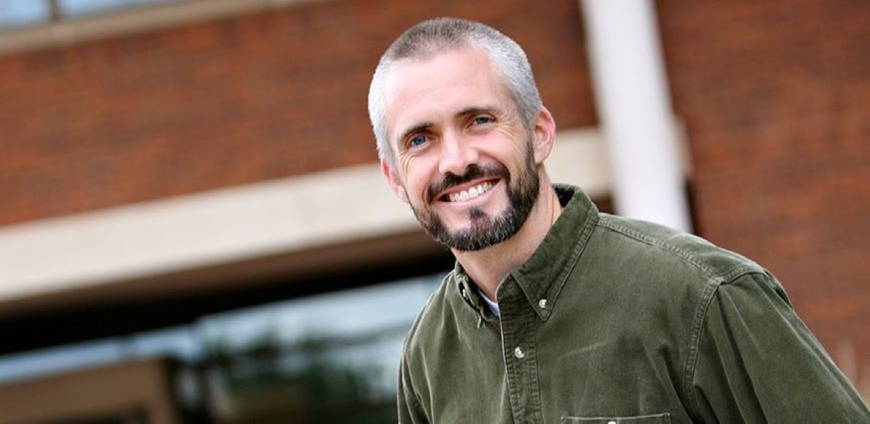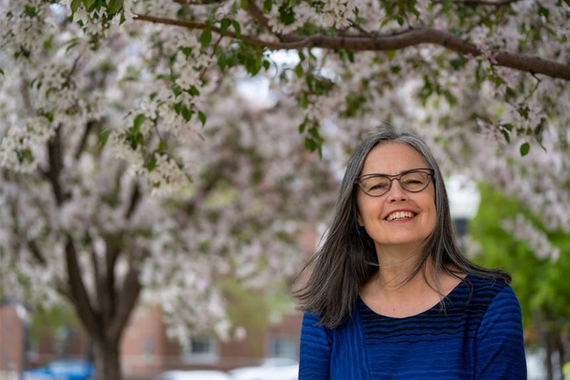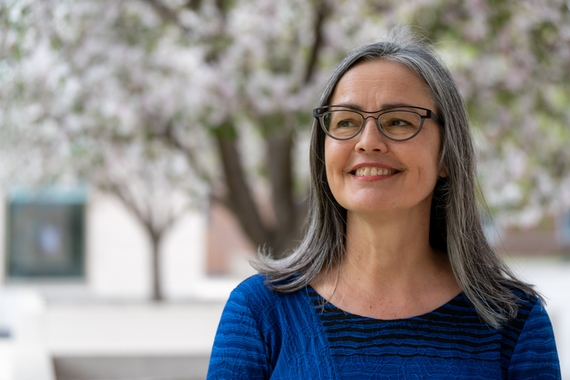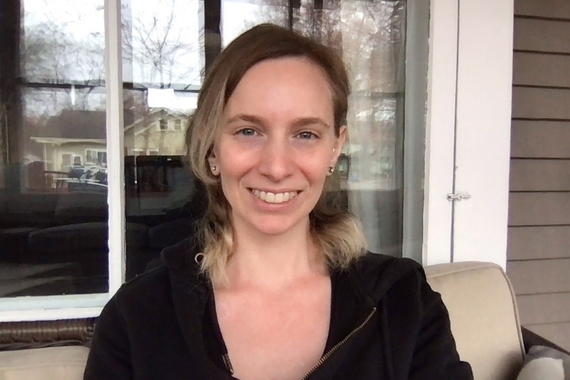Alan Love places “evo-devo” front and center
Established in 1987, the Winton Chair in the Liberal Arts was designed to encourage innovative, distinctive research or creative work that “questions established patterns of thought.” As the newest Winton Chair, Professor of Philosophy Alan Love fulfills that objective and more.
The benefactors, David Michael Winton and Penny Rand Winton, expressed interest in supporting individuals whose work challenges cultural paradigms and represents important breaks from dominant patterns of thought. Professor Love, who also is director of the Minnesota Center for Philosophy of Science, recently answered questions that lend insight into how his career brought him to this influential role.
How would you describe your work?
My research focuses on conceptual issues that arise in different areas of biological science. Much of my work has concentrated on the concepts of evolutionary innovation and novelty, which have been at the center of the research agenda for evolutionary developmental biology (evo-devo). I also am interested in issues that arise in developmental biology and paleontology. I use a combination of approaches to investigate a variety of philosophical questions: conceptual change, explanatory pluralism, the structure of evolutionary theory, reductionism, the nature of historical science, and interdisciplinary epistemology. Another area of interest concerns methodological questions, such as the role of history and the nature of intuitions generated by thought experiments in philosophical inquiry.
How did you make your way to Minnesota?
I grew up in San Diego and went to the Massachusetts Institute of Technology (MIT) where I spent my first four real winters in the Boston area. After MIT, I did graduate work in biology, history and philosophy of science, and philosophy in Indiana and Pittsburgh. With a PhD in hand, I took my first position as assistant professor at UC Santa Cruz where my office looked out over Monterey Bay. So some might wonder, “why would anyone leave California to come to Minnesota?” But the decision wasn't difficult. Minnesota was attractive for its intellectual community and the Center for Philosophy of Science has a long history and strong reputation. Established in 1953, it’s the oldest research center at the University and has been central to intellectual developments in the field for decades. Additionally, the program in the History of Science, Technology, and Medicine collaborates actively with the Center. I traded perpetual sun for a rich intellectual community that is unique in bringing the philosophy of science and history together.
When did you decide to pursue philosophy?
I didn’t know what I wanted to be until I was mostly grown up (and how much I am is debatable). It was not clear even late into my undergrad work that I was interested in philosophy; I didn’t take a philosophy class until my junior year. Even then I was studying biology and there was no point of contact between the two because none of the philosophy classes were about science. I like to communicate the story of my trajectory to undergraduates--the eventual place you land might not be even glimpsed early on. People are often putting pressure on themselves to figure it all out long before they should (or even can).
What is “evo-devo" and why is it philosophically interesting?
For much of the 20th century, evolutionary biology developed independently from developmental biology. Although in earlier times there had been a lot of interaction between studies of development and studies of evolution, their independence, especially in post WWII Anglo-American science, made it difficult for the two communities to be in conversation. How could they mutually inform one another? This question was poignant because a number of long-standing problems in evolutionary biology seemed to require input from developmental biology and vice versa.
Beginning primarily in the 1980s, there was a renaissance in conversations about how to put evolution and development together: “evo-devo” emerged in the 1990s. The story is complex, but philosophically fascinating. Here were two communities with their own evaluative standards for what counted as a good explanation and using different concepts: How were those differences in standards and concepts negotiated or not, and what does this tell us about the structure of knowledge across disciplines? Does it become a hybrid construct? Or does one standard hold strong and the other give way? Or does some novel epistemological organization result?
Another example where I’ve examined these issues is the difference in how developmental biology and physics investigate and explain embryos. In biology, the focus has been on gene expression. In physics, the embryo is treated as a mass that bends, folds, and changes. Both groups of scientists want to understand these complex processes but their standards and approaches are different.
More generally, these case studies suggest that there is not only one way to do good science. Clashes don’t make sense from outside. An outsider might ask, “don’t they all have the same standards?” or “why don’t they just use the scientific method?” The insight is that standards differ and there is no such thing as “the” scientific method.
It’s important to recognize the differences in how sciences work. And part of that recognition involves looking backward: who trained whom, when did a professional society form, etc. History is essential to understand why scientists are committed to one experimental strategy or theoretical model over another, and its importance is magnified in interdisciplinary contexts.
We also tend to forget how the sheer growth of the sciences fosters some of this. It used to be you knew everybody in the field--100 to (maybe) 1,000 people. Now there are tens of thousands of people and disciplines routinely fracture into sub-disciplines to manage community dynamics. We are in an intriguing moment when scientific progress has led to epistemological knots that need to be disentangled.
How would you say this approach is particularly important and relevant in our modern age of pandemic and civil unrest?
Recently I have been looking into the biological response to stress in evolution. A number of key signaling proteins seem to be derived from reactions to wound inflammation or toxins in the environment. For example, in mammalian pregnancy the presence of the conceptus in the uterus should trigger an inflammatory immune response with associated changes in gene expression. In marsupials it does, and that’s why very small joeys head for the pouch of the mother kangaroo. However, for placental mammals like us that doesn’t happen. Why not? Research suggests a new cell type (the decidual stromal cell) originated that has the inflammatory gene expression profile but does not trigger a full wound-repair response upon implantation. Placentals have normalized that inflammation, which allows mammals to carry a fetus, for almost two years in elephants. It appears these stress reactions have been co-opted during evolution to initiate a change that becomes a permanent, new way of doing things.
Independent of fascinating comparative zoology, the larger message is that there is a positive role for stress in evolution and development. My collaborator and I currently have a paper under review that attempts to make this more generalized argument and we were blown away by just how many examples one can find that fit this model, from algae and slime molds to plant cuticles and whale skin. Certain kinds of stresses can lead to biological changes, though it depends on how sustained and specific stressors are. We also are looking to partner with psychologists to further explore these ideas in cross-disciplinary work.
What we’re learning is that we need to be careful in saying we want to eliminate all stressors. Life seems to thrive and be creative with the right degree of friction or stress. Remove too much of it and there can be unintended consequences.
How does the Winton Chair in the Liberal Arts allow you to do what wasn’t possible before?
It offers opportunities to do interdisciplinary, scholarly work that breaks out of standard paradigms and charts a novel path for other scholars to follow. Sometimes this involves returning to concepts that have been neglected in recent research. I’m currently organizing a large interdisciplinary project with philosophers and scientists on questions of agency, directionality, and function in biological systems that involves cutting against certain dominant modes of thought. The Winton Chair gives me the necessary time and space to translate these efforts into reality.
Another area where we are pushing the envelope is at the intersection of genomics and explanations of human traits or behavior, such as intelligence or aggression. In collaboration with CLA colleagues in psychology and statistics, as well as investigators at the National Human Genome Research Institute at the NIH, we are in the beginning stages of coordinating multidisciplinary workshops to look at different facets of the controversial intersection of genomics and society that fully appreciates the complexities involved. These efforts follow earlier collaborations, such as a forthcoming, multi-authored book on the thirty year legacy of the Human Genome Project and publications from a grant focused on the Genetics of Human Agency. The Winton Chair provides crucial momentum to these activities so that we can go further and collaborate with other colleges and scholars all over the world to open up new avenues of investigation and understanding. We’re fortunate to have donors like the Wintons with the generosity and vision to realize the importance of this sort of interdisciplinary work.
What energizes you about the work done through the Center for Philosophy of Science?
The most exciting thing about the Center is that it’s a place where...as one faculty member described it...we can do what we came to the university to do: engage with complex and difficult issues that range across the sciences and the humanities in an environment where there is mutual appreciation for the interdisciplinary expertise people bring, along with humility regarding how we need each other because of the scope and size of these issues.
The Center is a hub where those interactions have taken place, been sustained over time, and continue to grow. That is important because some of what we’re doing is a “slow burn” that needs to happen regularly but doesn't show up too readily on a quarterly balance sheet as a tangible outcome. In the long run, there will be tremendous pay off and overflow.
In a funny sort of way, the intangibles are the most palpable. You can always point to the published paper or the new grant as concrete deliverables. But the intellectual community itself is not something that fits as a line item and it is a necessary precursor to tangible outputs.
Being able to nurture and stimulate this core intellectual community and develop connections with new people...especially engaging with those who think differently...is what gets me out of bed each day. I can’t believe I get paid to do this.



